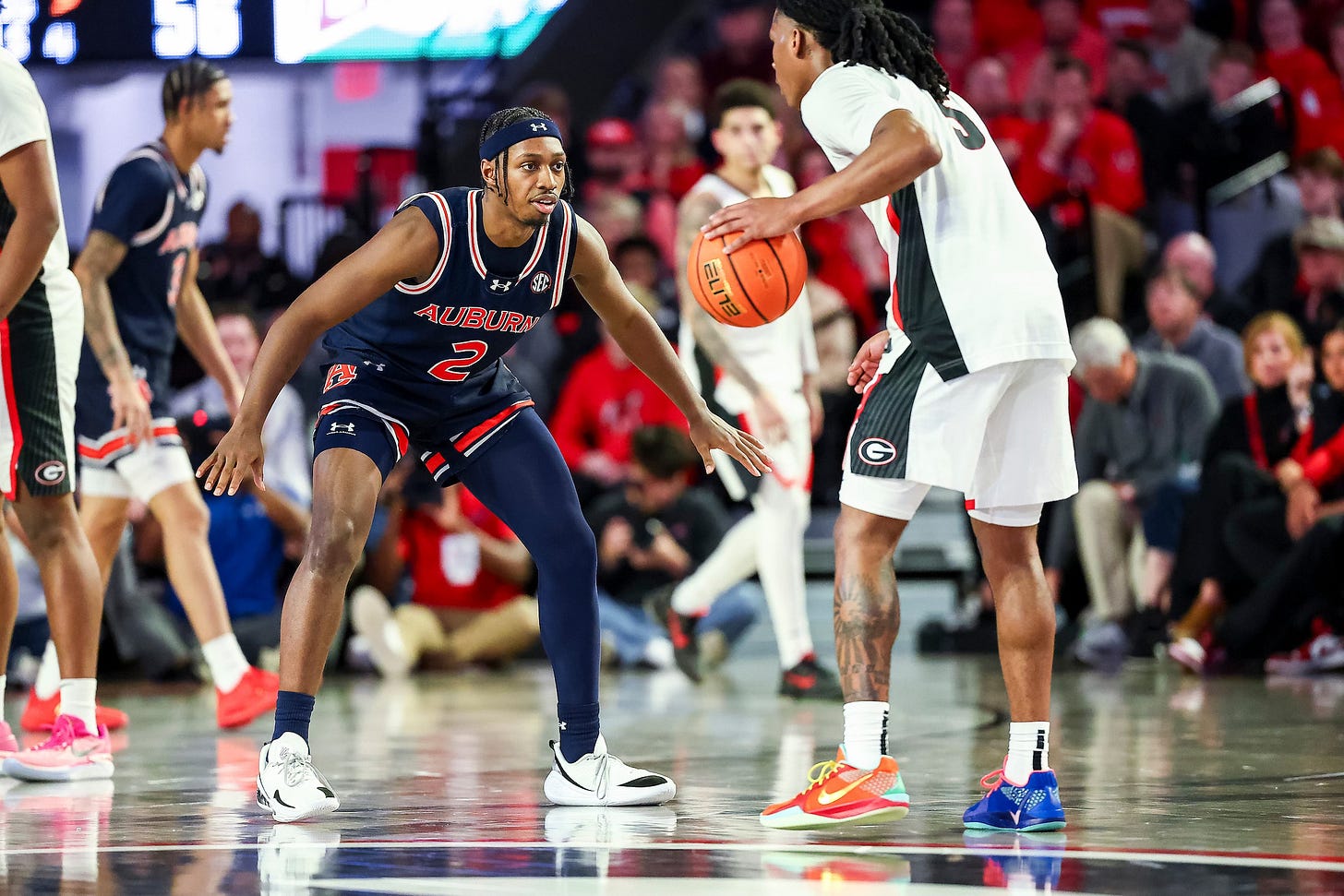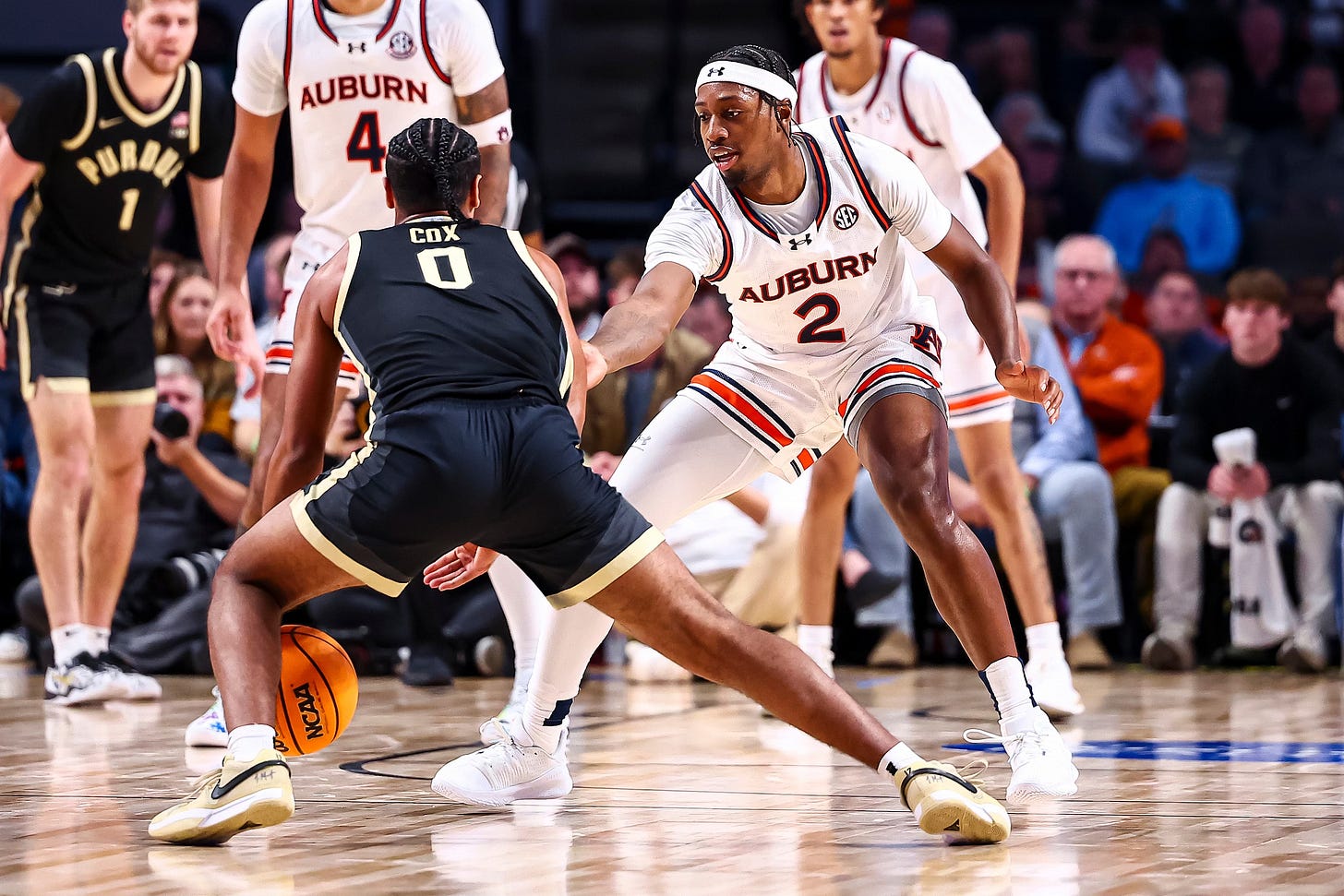A closer look at "The Denver Jones Effect"
Jones might not have the classic defensive stats, but the numbers of his primary matchups in all 18 of Auburn's games tell the real story.
(Zach Bland/Auburn Tigers)
AUBURN — Although stats show us so much in basketball, they can lie sometimes.
For example, if you were to scroll through the defensive numbers for Denver Jones, you won’t be blown away by anything.
Jones’ defensive rating is 105.1, which is the highest (read: worst) of all rotation players for Auburn this season. His on/off defensive rating is just -1.7, which means the Tigers are just a little bit better defensively with him on the floor as opposed to on the bench. His defensive win shares and defensive box plus/minus are both down from last season. He currently has his lowest steal rate (1.5%) of his career, too.
A quick glance at the numbers would tell you that Jones isn’t a valuable defender. In fact, they might tell you that he’s one of the worst defenders on the team.
And that couldn’t be further from the truth.
Considering so much of individual defensive statistics in basketball are tied to either team performance or the traditional counting categories like steals and blocks, Jones won’t get the all-defense hype that others across the SEC will this season.
But the eye test — especially from those who know the game the best — will show you that Auburn has a legitimately elite stopper on the perimeter in Jones.
“You may not notice him as much in the stat sheet,” Auburn head coach Bruce Pearl said earlier this season. “But every coach and every scout notices him as one of the best defensive guards in the country.”
Jones’ transformation into a defender who Pearl constantly raves about has been one of the most remarkable breakthroughs in the latter’s coaching tenure on the Plains.
In the first two seasons of his Division I career, Jones was a pure bucket-getter. At Florida International, he averaged 16.2 points per game — including a Conference USA-leading 20.1 as a sophomore — while attempting more than a dozen shots in virtually every single game.
Jones’ workload on offense was massive. He had to shoot a lot to help FIU merely survive, and his team finished No. 195 and No. 248 in KenPom in adjusted defensive efficiency. Defending was secondary to what the Panthers needed from Jones.
After transferring to Auburn, Jones knew he was going to have to do a lot more on that end of the floor. Pearl is highly regarded for his defensive system, one that requires relentless effort and complete buy-in from everyone. His minutes and his shot attempts were going to go down, and his defensive responsibilities were going to go way, way up.
Jones’ focus on improving as a defender came at a detriment to his offensive production. He didn’t hit his stride as a shooter until he got into SEC play. In the offseason, after playing almost all of his minutes as an off-ball guard, he had to pick up running the point in a revamped backcourt.
That meant Jones would have to take even more ownership on offense, as well as adjusting to guarding a new cast of characters on defense.
“That's something that he's done himself,” Pearl said. “That's just a real commitment that he made. He started last year, and it's continued on this year. Then, by asking him to play some point guard and play in two positions, he's got to be really locked into what we're doing and really paying attention.
“Because that's hard, to play both positions, and it also takes a little bit away from some of his scoring.”
Fast-forward to now. Auburn is 18 games into the season and is, for the first time ever, the unanimous No. 1 team in the country. The Tigers are the only Division I squad that hasn’t taken multiple losses yet. They also have a chance to shatter records when it comes to their NCAA Tournament resume.
This has all happened with Jones turning into Auburn’s starting point guard. His offense is up across the board this season, as he’s improved in points per game, field goal percentage, 3-point percentage, free-throw percentage and assists per game.
But, perhaps most importantly to Auburn, he’s done all of that while being one of the most feared defenders in major college basketball.
“His instincts are just crazy,” fellow guard Miles Kelly said recently. “They're second to none. He really just stays solid. A lot of not-good defenders, they jump at everything and (are) real antsy. But he just stays solid on every move, and it makes him a great defender.”
(Zach Bland/Auburn Tigers)
Switching between point guard and shooting guard, Jones is playing nearly two-thirds of all the available minutes for Auburn this season. He’s second on the team in playing time, only trailing All-American center Johni Broome in minutes per game.
Jones went the first three games without getting called for a single foul, and he’s been whistled for more than two in just four games all season. Even in matchups where his offense isn’t clicking — like Auburn’s close road win at Georgia last Saturday — he’s been able to stay on the floor in crunch time because of his defense.
“I feel like defense is kinda like a want-to,” Jones said earlier this season. “Honestly, like, my dad has been preaching a lot about defense, ever since I've been playing basketball. I feel like that's been my main focus, especially when I got here.
“I just really hate when people score on me.”
And that is where Jones’ true impact is found on the defensive end.
After Auburn beat Mississippi State by 22 points without Broome last week, Pearl told the assembled media in the postgame press conference to “look at the matchup Denver Jones has” and track what he’s done defensively.
So, with Auburn having a midweek break before a massive showdown this Saturday against Tennessee, we did just that.
We went back through all 18 of Auburn’s games this season to track which player Jones guarded the most and tallied their final stats.
What we found has been one of the biggest stories of the season for Auburn: An ability to put an elite defender on a key matchup and take a chunk out of the opposition’s preferred way to play offense.
Keep reading with a 7-day free trial
Subscribe to The Auburn Observer to keep reading this post and get 7 days of free access to the full post archives.



